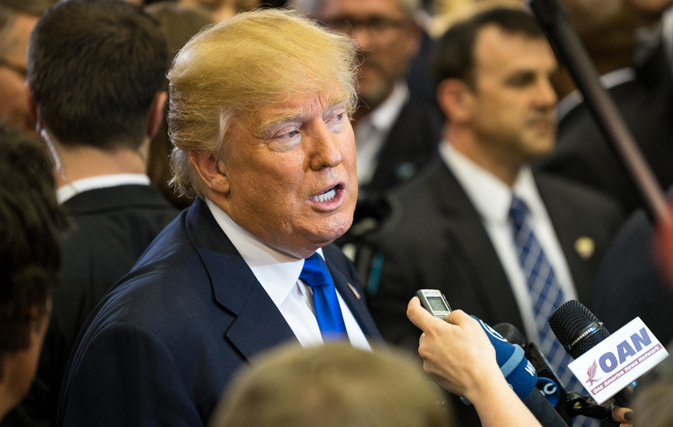GREENBELT, Md. — President Donald Trump’s revised travel ban has suffered another federal court setback after a judge in Maryland rejected a revised measure that bans travel targeting six predominantly Muslim countries.
Judge Theodore Chuang ruled Thursday in a case brought near the nation’s capital by the American Civil Liberties Union and other groups representing immigrants, refugees and their families. The groups argued that the underlying rationale of the ban was to discriminate against Muslims, making it unconstitutional. Chuang granted a preliminary injunction nationwide basis.
It was the latest ruling against Trump’s revised travel ban. On Wednesday, a judge in Hawaii rejected the ban.
Government lawyers argued that the ban was substantially revised from an earlier version signed in January that was later blocked by a federal judge in Washington state. They said the ban was ordered in the interest of national security to protect the U.S. from “radical Islamic terrorism.”
The Maryland plaintiffs also argued the ban illegally reduces the number of refugees authorized to enter the U.S. this year. Chuang granted a preliminary injunction prohibiting the enforcement of the travel ban nationwide pending further orders from the court. He declined to stay the ruling should an emergency appeal be filed.
The White House did not immediately respond to the Maryland ruling.
The Wednesday ruling came from U.S. District Judge Derrick Watson in Honolulu, who rejected the government’s claims that the travel ban is about national security, not discrimination. Watson also said Hawaii would suffer financially if the executive order constricted the flow of students and tourists to the state, and that Hawaii was likely to succeed on a claim that the ban violates First Amendment protections against religious discrimination.
Watson criticized what he called the “illogic” of the government’s arguments and cited “significant and unrebutted evidence of religious animus” behind the travel ban. He also noted that while courts should not examine the “veiled psyche” and “secret motives” of government decision-makers, “the remarkable facts at issue here require no such impermissible inquiry.”
“For instance, there is nothing ‘veiled’ about this press release: ‘Donald J. Trump is calling for a total and complete shutdown of Muslims entering the United States,”’ Watson wrote, referring to a statement Trump issued as a candidate.
Trump called the ruling an example of “unprecedented judicial overreach” and said his administration would appeal it to the U.S. Supreme Court. He also called his new travel ban a watered-down version of the first one, which he said he wished he could implement.
“We’re going to win. We’re going to keep our citizens safe,” the president said at a rally in Nashville. “The danger is clear. The law is clear. The need for my executive order is clear.”
If the administration seeks an emergency stay of Watson’s decision at the 9th Circuit, the matter would be heard by different judges from the three who ruled on the case last month. That’s because the panel of judges assigned to such cases rotates every month, said court spokesman David Madden.
The 9th Circuit on Wednesday declined to reconsider the 3-0 decision not to reinstate the original ban. In a dissent, five judges said they considered that decision incorrect and wanted it vacated.
“Whatever we, as individuals, may feel about the president or the executive order, the president’s decision was well within the powers of the presidency,” Judge Jay Bybee wrote for the five.
Watson issued his 43-page ruling less than two hours after hearing Hawaii’s request for a temporary restraining order to stop the ban from being put into practice.
The hearing was one of three held Wednesday in federal courts around the country. U.S. District Judge James Robart in Seattle, who blocked the initial travel ban last month, did not immediately rule on a request from an immigrant-rights group to block the revised version.
In all, more than half a dozen states are trying to stop the ban. A case brought by Washington state argues that the new order harms residents, universities and businesses, especially tech companies such as Washington state-based Microsoft and Amazon, which rely on foreign workers. California, Maryland, Massachusetts, New York and Oregon have joined the claim.
Trump’s initial travel ban, issued on a Friday in late January, brought chaos and protests to airports around the country as travellers from seven nations – Somalia, Iran, Iraq, Syria, Sudan, Libya and Yemen – were barred from entering even if they had prior permission to come to the U.S. The State Department cancelled up to 60,000 visas, but later reversed that decision.
Robart ordered the government to stop enforcing the ban, which also suspended the nation’s acceptance of refugees from around the world, and a three-judge panel from the 9th U.S. Circuit Court of Appeals unanimously declined to reinstate the ban.

